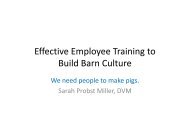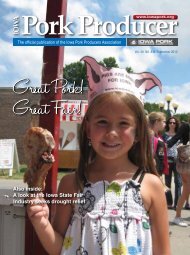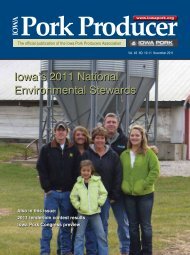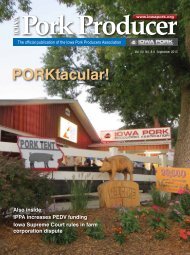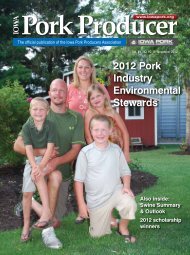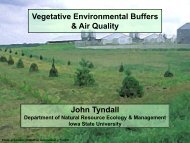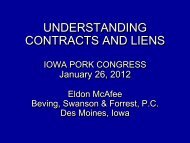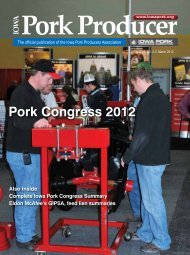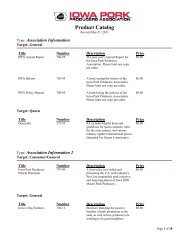September 2011 - Iowa Pork Producers Association
September 2011 - Iowa Pork Producers Association
September 2011 - Iowa Pork Producers Association
You also want an ePaper? Increase the reach of your titles
YUMPU automatically turns print PDFs into web optimized ePapers that Google loves.
investigations of the egg industry. The groups want the<br />
agreement codified in a federal animal welfare law that<br />
pre-empts state laws.<br />
In a press statement, NPPC said such a one-size-fitsall<br />
approach will take away producers’ freedom to<br />
operate in a way that’s best for their animals, make it<br />
difficult to respond to consumer demands, raise retail<br />
prices and take away consumer choice, devastate<br />
niche producers and, at a time of constrained<br />
budgets for agriculture, redirect valuable resources<br />
from enhancing food safety and maintaining the<br />
competitiveness of U.S. agriculture to regulating<br />
on-farm production practices for reasons other than<br />
public health and welfare.<br />
NPPC urges Codex to adopt guidelines<br />
on parasites that are science-based<br />
National <strong>Pork</strong> <strong>Producers</strong> Council consultant Dr. Ray<br />
Gamble, director of the Fellowships Office of the<br />
National Academies’ National Research Council, and<br />
Dr. Paul Sundberg, National <strong>Pork</strong> Board vice president<br />
of science and technology, recently participated in a<br />
Codex Alimentarius Commission working group that is<br />
developing guidelines on parasites in meat.<br />
Gamble, who previously was laboratory director of<br />
the Parasite Biology and Epidemiology Laboratory for<br />
USDA’s Agricultural Research Service, is one of the<br />
world’s foremost authorities on zoonotic parasites.<br />
At a meeting in July, the Codex commission approved<br />
new work to develop “Guidelines for control of<br />
specific zoonotic parasites in meat: Trichinella spiralis<br />
and Cysticercus bovis.” NPPC worked closely with<br />
the commission, U.S. delegates and other industry<br />
stakeholders in the United States and in other countries<br />
to keep any new work from duplicating, contradicting or<br />
narrowing the current efforts of the World Organization<br />
of Animal Health (OIE).<br />
The European Union developed its own draft guidelines<br />
on controlling zoonotic parasites in meat and wants<br />
Codex to adopt them as international standards, which<br />
only a few countries in the EU could meet<br />
NPPC will continue to urge Codex to develop sciencebased<br />
standards for the safe trade of food.<br />
Your participation in the Strategic<br />
Investment Program allows the<br />
National <strong>Pork</strong> <strong>Producers</strong> Council and<br />
state organizations to enhance and defend your opportunities to<br />
compete at home and abroad.<br />
Negotiate for fair trade (import/export)<br />
Fight for reasonable legislation<br />
Fight for reasonable regulation<br />
Inform and educate legislators<br />
Provide producers direct access to lawmakers<br />
Proactive issues management with media<br />
Secure and guide industry research funding<br />
Enhance domestic and global demand<br />
Provide producer information and education<br />
Strategic<br />
Investment<br />
Program<br />
Mandatory<br />
<strong>Pork</strong><br />
Checkoff<br />
Funding $0.10/$100 $0.40/$100<br />
Your voluntary investment is NPPC’s primary source of funding;<br />
Checkoff dollars cannot be used for public policy funding.<br />
The National <strong>Pork</strong><br />
<strong>Producers</strong> Council (NPPC)<br />
conducts public policy<br />
outreach on behalf of its<br />
44 affiliated state<br />
association members<br />
enhancing<br />
opportunities for the success of U.S. pork<br />
producers and other industry stakeholders by<br />
establishing the U.S. pork industry as a consistent<br />
and responsible supplier of high quality pork to the<br />
domestic and world market.<br />
NPPC is primarily funded through the Strategic<br />
Investment Program, a voluntary producer investment<br />
of $.10 per $100 of value that funds state and national<br />
public policy and regulatory programs on behalf of U.S.<br />
pork producers.<br />
For more information on NPPC, visit www.nppc.org.<br />
SEPTEMBER <strong>2011</strong><br />
37




